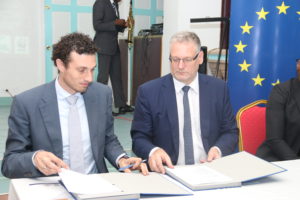The World Wildlife Fund (WWF) Guianas and the European Union (EU) signed and launched a project which will significantly enhance the protection of marine and coastal resources of Guyana and Suriname.
The project, entitled, “Promoting Integrated and Participatory Ocean Governance in Guyana and Suriname: the Eastern Gate to the Caribbean,” will see both countries setting aside 10 per cent of its Exclusive Economic Zones (EEZ) as marine protected areas by 2020, in keeping with its commitment to the United Nations (UN) Convention on Biological Diversity – which both countries had signed.

The EU allocated a €1.25 million grant for the project to be executed by WWF in collaboration with the Protected Areas Commission of Guyana and the Nature Conservation Service of the Suriname Government.
The project is expected to fill critical information gaps by developing comprehensive and visually appealing spatial data (Geographical Information Systems atlas and three-dimensional ocean maps) collated through participatory processes, enabling informed decision-making, regarding marine protection and management.
WWF Guianas Representative, Laurens Gomes, during the signing ceremony in Guyana which was held at the Regency Suites on Monday, explained why he regards the ocean as one of the greatest gifts to mankind.
“The ocean itself captures more CO2, more carbon, than all of the forests in the world and that dynamic is very important to climate stability. Fisheries is another good example, it is a very critical food source for global communities,” he noted, as he stressed the importance in protecting the world’s ocean spaces.
EU Ambassador Jernej Videtic, in delivering his remarks, highlighted that roughly “1.1 million people will directly and indirectly benefit from the project as it aims at addressing the challenges deriving from climate change, fisheries, carbon storage, and thus contributes to decreasing the vulnerability of this part of the region.”
Director of the Department of Environment at the Ministry of the Presidency, NdibiSchwiers, lauded this initiative, noting that such a venture is timely.
“This initiative is intended to contribute to human wellbeing, especially for the coastal population and there is a possibility, we understand, to develop and expand the economic activities along the coast,” she stated.
Meanwhile, the area around which the project revolves, supports important fisheries, major nursery grounds, spawning grounds and a rich diversity of marine species and is of both regional and global significance. Whilst key threats are recognised (overfishing of some species; increased hydrocarbon exploration) there are significant data gaps which hamper efforts to sustainably manage the marine environment.
It is envisioned that increased marine protection and strengthened governance will safeguard biodiversity and enhance food security, protect livelihoods, increase resilience and support socio-economic development in these countries.
This project will demonstrate that compelling data, participatory spatial planning and targeted capacity building can conserve biodiversity and foster economic activities compatible with ocean health.



